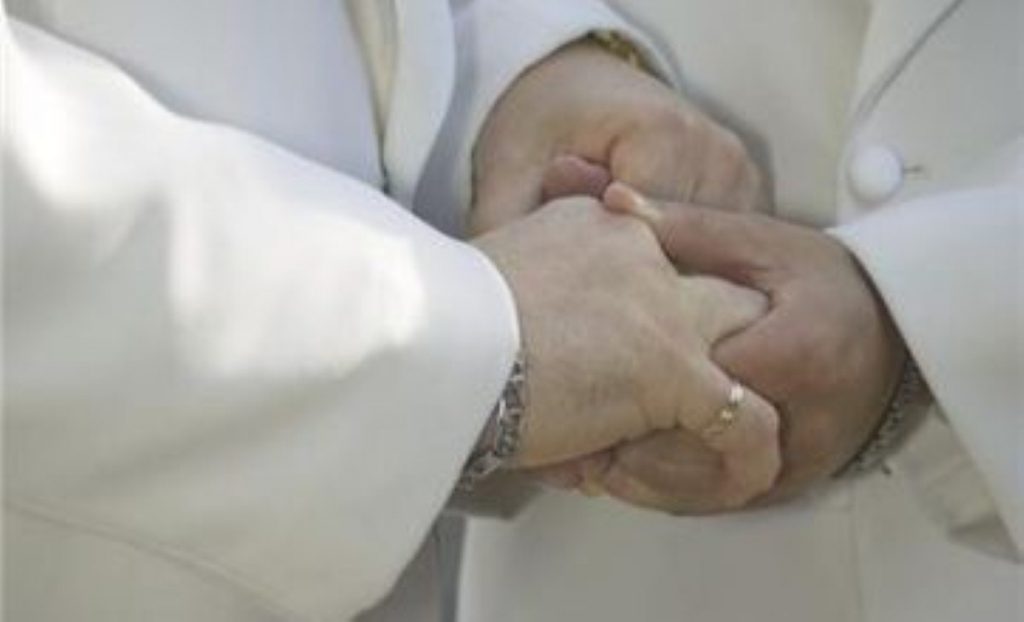Scottish ministers rule out a vote on gay marriage
By Cassie Chambers
The Scottish Cabinet ruled out a referendum on same-sex marriage yesterday, despite strong criticism from opponents.
Ministers rejected religious groups' argument that extending marriage rights requires a national vote on the issue, instead claiming that the topic is one of "conscience not constitution".
"During the discussion, recent calls for a referendum on the subject were carefully considered. However, Cabinet views this as an issue of conscience not constitution," said a government spokesman.


As such, the government argued a referendum "would not be appropriate".
The move was blasted by the religion-heavy coalition that has formed to oppose same-sex marriage, who insisted the government's decision was "dangerous".
“The dangers of the changes that are being proposed to the very meaning of marriage will entail a breadth of change that most people, including our politicians, have simply not reflected on,” Cardinal Keith O’Brien, head of the Catholic Church in Scotland, wrote in a newspaper article.
“Do people really understand that they will be sweeping the terms husband and wife from our marriage laws? Do they really understand that those who merely wish to modestly uphold their understanding of marriage could be disciplined in their places of work?”
Proponents argue a referendum would allow the public to have a say on this important issue; opponents claim subjecting marriage rights to a vote is undemocratic.
Instead of a popular vote, the government said it would "ask a cabinet sub-committee, led by the deputy first minister, to further examine some particular issues of detail before a final decision is reached."
The decision to delay was widely criticised by the "rainbow coalition" that has formed in support of same-sex marriage, as many expected the government to reach a final decision during its meeting yesterday.
"While we are disappointed that no decision was made today we are pleased that the Scottish government has confirmed that a referendum has been ruled out," director of the gay rights charity Stonewall Scotland said.
"Ministers have stated that a final decision on a way forward will be at the end of this month, we look forward to that and urge them to stick to their guns and say I do to equal marriage."
Yesterday's ministerial meeting was held to discuss the results of an 80,000 person consultation on same-sex marriage, a process that saw three times as many participants as the consultation on Scottish independence.
The Equality Network, who has been a major player in arguments against a referendum, expressed mixed emotions in response to the government's actions.
While the organisation said it was pleased that there will be no referendum, it suggested the decision to postpone may be the result of a lack of political will to act.
"The government have had seven months to analyse the consultation responses and to deal with the detail. We cannot understand why there is any need for further delay," said Tom French, the policy coordinator of the group.
Yet gay rights groups are confident that they will ultimately triumph in this political battle. The Equality Network claims that 74 of 129 members of the Scottish parliament favour extending marriage to same-sex couples.
Prior the beginning of the consultation, the government went on record saying that it "tends toward the view" that same-sex marriage should be legalised, yet believes that faith groups should not be forced to conduct the ceremonies.
The issue of same-sex marriage has been a challenging one for the Scottish National Party (SNP), who came to power promising to consider the issue as part of its agenda to create a more "equal" society.
Yet ahead of the referendum on Scottish independence, many in the party worry that extending marriage rights could "alienate" voters.
Nevertheless, the government said it would press ahead with the issue, stating: "We remain committed to publishing the consultation responses and our clear decision on the way forward before the end of this month."
Currently same-sex couples in Scotland can enter into civil partnerships, which carry the same legal rights as marriage but not the same societal status.
If the Scottish government decides to extend marriage rights, it would be the first in the UK to do so.
Same-sex marriage has been on the policy agenda in England and Wales as well; ministers in these countries will likely soon have to make similar policy decisions about this controversial issue.









